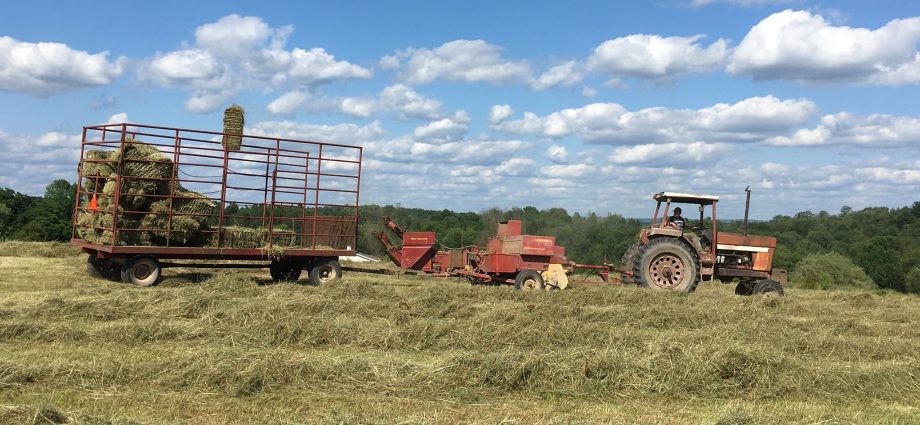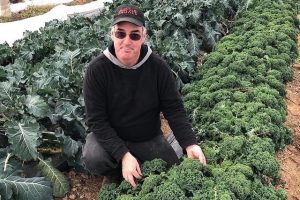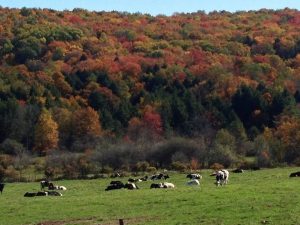Hay season at the Empet farm (top) near New Milford and Mike Russell Sr. (above) at Russell Farms near Brackney.
By Rick Hiduk
(originally published in the Susquehanna County Independent)
Most ag producers in the area reported brisk business during the pandemic as people had the time to look closer to home for the produce and meat they needed. It was win-win for the public and an industry that often struggles despite being the state’s greatest economic force.
But 2022 has brought new hurdles and obstacles to overcome that could cause producers to limit some operations and result in increased costs for both farmers and consumers. Among them are inflation, supply chain kinks, controls on milk prices, wild weather, labor shortages, and skyrocketing fuel costs. Add to that a new quarantine – this one on poultry due to the avian flu.
Nonetheless, nobody interviewed for this story seems ready to throw in the towel. Farming is deeply entrenched in the heritage of Susquehanna County. It is not a lifestyle that is easy to walk away from, regardless of the fact that it is such a tough business to be in.
“If we get a break on one angle, there’s always something hitting you from another angle,” said dairy farmer Rob Reyan of Middletown Township. He and his wife Holly also plant more than 100 acres of corn. “The grains are bringing better prices, but the cost is always outpacing it.”
“I think that everything that we need to grow is going to be more expensive this year,” said Mike Russell Sr., owner of Russell Farms near Brackney, growers of apples, berries, pumpkins and hay. He expressed his frustration at paying $5.29 per gallon for diesel fuel last Monday, nearly a dollar more than the week before. Factoring in higher costs for fertilizer this year, Russell is certain that what growers pay now will trickle down to the consumer. “It’s a pretty significant increase. I don’t know how you absorb it.”
“I think what’s driving everything right now is the cost of fuel,” Jim Barbour of Liberty Township suggested. “It’s especially hard if you’re a dairy farmer. You get what you get for your milk, but you still have to transport it to where it’s going.”
In addition to producing organically-raised vegetables and herbs, grass-fed American Aberdeen beef, and organically-fed, pasture-raised pork on his own farm, Barbour (above) also serves as the Susquehanna County Farm Bureau vice president. He represents Susquehanna, Wayne, Pike, Wyoming and Lackawanna counties as a region on the state’s executive committee. In advance of the growing season, he has been traveling extensively for meetings across the Commonwealth.
As he wrapped up a series of meetings near Pittsburgh on March 8, he was already planning for three days of meetings at the Pennsylvania State Farm Bureau office in Camp Hill the following week. “We’ll be talking about a lot of these things,” Barbour related. “We’re working hard at bringing a fairness to how dairy farmers are being paid for their milk. We’ll also be looking at the avian flu.”
On March 8, the USDA and PA Department of Agriculture enacted a quarantine in Pennsylvania when it was announced that the avian flu had been found in poultry in Maryland. “Pennsylvania is trying to keep it out. It’s not just chickens, but ducks and turkeys and everything we grow,” Barbour remarked. In reference to a recent report by the Penn State Extension that avian flu has also been detected in migratory birds, he added, “How do you stop geese from flying over? It’ll be here eventually.” If poultry in Pennsylvania tests positive, he noted, the quarantine will likely be strengthened.
As for milk prices, Pennsylvania Farm Bureau members recently voted to support elimination of both the over-order premium (OOP) and minimum wholesale and retail pricing in Pennsylvania. “There are a lot of games being played with transportation for someone who has to ship their milk across state lines to be processed,” Barbour stated. “Over-order premium is only paid on milk that is produced, processed and sold in Pennsylvania.”
For rural dairy farmers who do not operate near processing plants, the only option for some is to ship their milk out of state, and increasing fuel prices reduces the value of their product. “That’s very costly. I don’t know what the hauling differential is going to turn into for what’s being sold and what’s being bought.” Farmers are prohibited from passing that price on to consumers on their own volition, Barbour related, “and that’s tough.”
Barbour is also concerned about how diesel costs will affect daily operations. “How are people going to be able to put fuel into their tractors for working the fields when they can’t charge more for their milk?”
Rick and Dana Empet currently ship milk from their New Milford area farm to Maryland and Virginia after the recent closure of Readington Farms in New Jersey where their milk went for more than 30 years. Rick explained that the co-ops provide an advance payment, but the final payment is delayed by more than a month, which will be mid-April in their case.
“It is going to cost quite a bit extra to have our milk shipped there, but we won’t see what kind of deductions there will be until then,” he stated. “The good thing is that we still have a market for our milk. Maryland and Virginia are looking for more milk.”
Though dairy farming is a year-round business, operators get a break from their fields in the winter and an opportunity to regroup. Rick Empet noted that they have yet to feel the pinch of inflation, but “We can see it coming. The price quotes for fertilizer are basically double from last year. In another four to six weeks, we will be cropping and will be using 2,000 gallons of fuel per month.”
Asked if the high prices might inhibit production, Rick said, “We’re still full steam ahead. You have to spend money to make money. It’s kind of like a domino effect. If you make one bad mistake, it will cost you a lot more in the long run.”
The Empets still have children on the farm who are getting old enough to take on more work – at least when school lets out. Rick would like to hire at least one more farm hand but acknowledges that the labor pool isn’t what it used to be. “People who want to work are working,” he remarked. “People who don’t are not.”
On the other side of the county, Rob Reyan is having trouble filling positions to keep his farm at peak operation. His adult sons have moved on to more lucrative employment. “It’s hard to find any workers, let alone good workers,” he stated. He would gladly employ two full-time workers to compliment what he does full time and what Holly can fit in when she comes home from her own full-time job.
“We just keep doing more with less. We do more ourselves and have less time,” Rick noted. “There’s cows to be milked and fed. There’s grounds and buildings to be kept, and that’s what slides when we don’t have the time and the people.”
Maintenance issues have also been strained by kinks in the supply chain. “People are having a tough time finding parts in a timely manner, and waiting a month for parts for something that you need to fix tomorrow is difficult,” Barbour remarked.
“We had some issues last year waiting for things – something as simple as a rubber v-belt. The dealer wouldn’t have any idea when they were coming,” Rick Empet concurred. “Luckily, we generally have two of everything on our farm. But that’s a big expense to have equipment that isn’t working when the weather allows. When the weather breaks, we have to be ready to go. There were times when we had to do a three-week course of hay in three or four days.”
Dairy cattle graze at the Empet farm in autumn.




Great explanation. Farming is a tough job!!